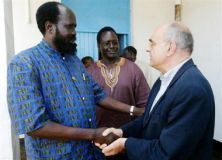South Sudan denounces Pronk expulsion
Oct 22, 2006 (NAIROBI) — The autonomous government of southern Sudan on Sunday denounced Khartoum’s expulsion of UN envoy Jan Pronk, deepening rifts in Sudan’s unity government formed after a north-south peace deal last year.
 The Government of Southern Sudan said it had not been consulted on Pronk’s expulsion, which it said was a “wrong decision” that could worsen deteriorating conditions in the troubled western Darfur region.
The Government of Southern Sudan said it had not been consulted on Pronk’s expulsion, which it said was a “wrong decision” that could worsen deteriorating conditions in the troubled western Darfur region.
And it said the move could hurt the federal administration, created in 2005 between Sudanese President Omar el-Beshir’s ruling National Congress Party and the south’s ex-rebel Sudan People’s Liberation Movement/Army (SPLM/A).
“It is a wrong decision and it is taking Sudan more and more to the brink of confrontation with the international community,” said Yasir Arman, Yasir Arman, deputy secretary-general of the former southern rebel Sudan People’s Liberation Movement (SPLM).
“More importantly, it will aggravate the situation in Darfur rather than looking for solutions in partnership with the international community,” he said. “Expelling Jan Pronk will not resolve the issue at hand, meaning Darfur.”
Earlier Sunday, Sudan’s federal government gave Pronk 72 hours to leave the country, accusing the envoy of “openly intruding in the armed forces’ affairs” by reporting army defeats in troubled Darfur on his personal website.
But Arman, speaking from south Sudan’s capital of Juba, complained the southern partners had not been consulted on a matter that directly relates to its signing of the January 2005 peace deal with Khartoum.
“Jan Pronk came to Sudan as a result of the Comprehensive Peace Agreement,” he said, referring to the accord that ended Sudan’s 21-year north-south civil war. “The government should have consulted the SPLM before expelling him.”
“The worrying situation is that there is a growing tendency in the National Congress Party to undermine the CPA,” Arman said, urging an immediate ceasefire in Darfur and cooperation between Khartoum and the international community.
Under the terms of the north-south accord, which ended what was then Africa’s longest-running conflict, the SPLM/A was given positions in the Khartoum government, including the post of first vice president and foreign minister.
But the two sides have since argued over numerous issues, including Darfur, where the government of south Sudan supports the deployment of UN peacekeepers and Khartoum is vehemently opposed.
The north-south war claimed at least 1.5 million lives and displaced some four million people while at least 200,000 people have died and more than two million have been displaced in Darfur since February 2003.
(AFP)
